- Home
- Barbara Kingsolver
The Bean Trees
The Bean Trees Read online
The Bean Trees
A NOVEL BY
BARBARA KINGSOLVER
For Ismene,
and all the mothers who have lost her.
CONTENTS
ONE
The One to Get Away
TWO
New Year's Pig
THREE
Jesus Is Lord Used Tires
FOUR
Tug Fork Water
FIVE
Harmonious Space
SIX
Valentine's Day
SEVEN
How They Eat in Heaven
EIGHT
The Miracle of Dog Doo Park
NINE
Ismene
TEN
The Bean Trees
ELEVEN
Dream Angels
TWELVE
Into the Terrible Night
THIRTEEN
Night-Blooming Cereus
FOURTEEN
Guardian Saints
FIFTEEN
Lake o' the Cherokees
SIXTEEN
Soundness of Mind and Freedom of Will
SEVENTEEN
Rhizobia
ABOUT THE AUTHOR
PRAISE
OTHER BOOKS BY BARBARA KINGSOLVER
COPYRIGHT
ABOUT THE PUBLISHER
ONE
The One to Get Away
I have been afraid of putting air in a tire ever since I saw a tractor tire blow up and throw Newt Hardbine's father over the top of the Standard Oil sign. I'm not lying. He got stuck up there. About nineteen people congregated during the time it took for Norman Strick to walk up to the Courthouse and blow the whistle for the volunteer fire department. They eventually did come with the ladder and haul him down, and he wasn't dead but lost his hearing and in many other ways was never the same afterward. They said he overfilled the tire.
Newt Hardbine was not my friend, he was just one of the big boys who had failed every grade at least once and so was practically going on twenty in the sixth grade, sitting in the back and flicking little wads of chewed paper into my hair. But the day I saw his daddy up there like some old overalls slung over a fence, I had this feeling about what Newt's whole life was going to amount to, and I felt sorry for him. Before that exact moment I don't believe I had given much thought to the future.
My mama said the Hardbines had kids just about as fast as they could fall down the well and drown. This must not have been entirely true, since they were abundant in Pittman County and many survived to adulthood. But that was the general idea.
Which is not to say that we, me and Mama, were any better than Hardbines or had a dime to our name. If you were to look at the two of us, myself and Newt side by side in the sixth grade, you could have pegged us for brother and sister. And for all I ever knew of my own daddy I can't say we weren't, except for Mama swearing up and down that he was nobody I knew and was long gone besides. But we were cut out of basically the same mud, I suppose, just two more dirty-kneed kids scrapping to beat hell and trying to land on our feet. You couldn't have said, anyway, which one would stay right where he was, and which would be the one to get away.
Missy was what everyone called me, not that it was my name, but because when I was three supposedly I stamped my foot and told my own mother not to call me Marietta but Miss Marietta, as I had to call all the people including children in the houses where she worked Miss this or Mister that, and so she did from that day forward. Miss Marietta and later on just Missy.
The thing you have to understand is, it was just like Mama to do that. When I was just the littlest kid I would go pond fishing of a Sunday and bring home the boniest mess of blue-gills and maybe a bass the size of your thumb, and the way Mama would carry on you would think I'd caught the famous big lunker in Shep's Lake that old men were always chewing their tobacco and thinking about. "That's my big girl bringing home the bacon," she would say, and cook those things and serve them up like Thanksgiving for the two of us.
I loved fishing those old mud-bottomed ponds. Partly because she would be proud of whatever I dragged out, but also I just loved sitting still. You could smell leaves rotting into the cool mud and watch the Jesus bugs walk on the water, their four little feet making dents in the surface but never falling through. And sometimes you'd see the big ones, the ones nobody was ever going to hook, slipping away under the water like dark-brown dreams.
By the time I was in high school and got my first job and all the rest, including the whole awful story about Newt Hardbine which I am about to tell you, he was of course not in school anymore. He was setting tobacco alongside his half-crippled daddy and by that time had gotten a girl in trouble, too, so he was married. It was Jolene Shanks and everybody was a little surprised at her, or anyway pretended to be, but not at him. Nobody expected any better of a Hardbine.
But I stayed in school. I was not the smartest or even particularly outstanding but I was there and staying out of trouble and I intended to finish. This is not to say that I was unfamiliar with the back seat of a Chevrolet. I knew the scenery of Greenup Road, which we called Steam-It-Up Road, and I knew what a pecker looked like, and none of these sights had so far inspired me to get hogtied to a future as a tobacco farmer's wife. Mama always said barefoot and pregnant was not my style. She knew.
It was in this frame of mind that I made it to my last year of high school without event. Believe me in those days the girls were dropping by the wayside like seeds off a poppyseed bun and you learned to look at every day as a prize. You'd made it that far. By senior year there were maybe two boys to every one of us, and we believed it was our special reward when we got this particular science teacher by the name of Mr. Hughes Walter.
Now him. He came high-railing in there like some blond Paul McCartney, sitting on the desk in his tight jeans and his clean shirt sleeves rolled up just so, with the cuffs turned in. He made our country boys look like the hand-me-down socks Mama brought home, all full of their darns and mends. Hughes Walter was no Kentucky boy. He was from out of state, from some city college up north, which was why, everyone presumed, his name was backwards.
Not that I was moony over him, at least no more than the standard of the day, which was plain to see from the walls of the girls' bathroom. You could have painted a barn with all the lipstick that went into "H. W. enraptured forever" and things of that kind. This is not what I mean. But he changed my life, there is no doubt.
He did this by getting me a job. I had never done anything more interesting for a living than to help Mama with the for-pay ironing on Sundays and look after the brats of the people she cleaned for. Or pick bugs off somebody's bean vines for a penny apiece. But this was a real job at the Pittman County Hospital, which was one of the most important and cleanest places for about a hundred miles. Mr. Walter had a wife, Lynda, whose existence was ignored by at least the female portion of the high school but who was nevertheless alive and well, and was in fact one of the head nurses. She asked Hughes Walter if there was some kid in his classes that could do odd jobs down there after school and on Saturdays, and after graduation maybe it could work out to be a full-time thing, and he put the question to us just like that.
Surely you'd think he would have picked one of the Candy Stripers, town girls with money for the pink-and-white uniforms and prissing around the bedpans on Saturdays like it was the holiest substance on God's green earth they'd been trusted to carry. Surely you would think he'd pick Earl Wickentot, who could dissect an earthworm without fear. That is what I told Mama on the back porch. Mama in her armhole apron in the caned porch chair and me on the stepstool, the two of us shelling out peas into a newspaper.
"Earl Wickentot my hind foot" is what Mama said. "Girl, I've seen you eat a worm whole when you were
five. He's no better than you are, and none of them Candy Stripers either." Still, I believed that's who he would choose, and I told her so.
She went to the edge of the porch and shook a handful of pea hulls out of her apron onto the flowerbed. It was marigolds and Hot Tamale cosmos. Both Mama and I went in for bright colors. It was a family trait. At school it was a piece of cake to pick me out of a lineup of town girls in their beige or pink Bobbie Brooks matching sweater-and-skirt outfits. Medgar Biddle, who was once my boyfriend for three weeks including the homecoming dance, used to say that I dressed like an eye test. I suppose he meant the type they give you when you go into the army, to see if you're color blind, not the type that starts with the big E. He said it when we were breaking up, but I was actually kind of flattered. I had decided early on that if I couldn't dress elegant, I'd dress memorable.
Mama settled back into the cane chair and scooped up another apronful of peas. Mama was not one of these that wore tight jeans to their kids' softball games. She was older than that. She had already been through a lot of wild times before she had me, including one entire husband by the name of Foster Greer. He was named after Stephen Foster, the sweet-faced man in the seventh-grade history book who wrote "My Old Kentucky Home," but twenty-two years after naming him that, Foster Greer's mother supposedly died of a broken heart. He was famous for drinking Old Grand Dad with a gasoline funnel, and always told Mama never to pull anything cute like getting pregnant. Mama says trading Foster for me was the best deal this side of the Jackson Purchase.
She snapped about three peas to every one of mine. Her right hand twisted over and back as she snapped a little curl of string off the end of each pod and rolled out the peas with her thumb.
"The way I see it," she said, "a person isn't nothing more than a scarecrow. You, me, Earl Wickentot, the President of the United States, and even God Almighty, as far as I can see. The only difference between one that stands up good and one that blows over is what kind of a stick they're stuck up there on."
I didn't say anything for a while, and then I told her I would ask Mr. Walter for the job.
There wasn't any sound but Henry Biddle using a hay mower on his front yard, down the road, and our peas popping open to deliver their goods out into the world.
She said, "Then what? What if he don't know you're good enough for it?"
I said, "I'll tell him. If he hasn't already given it to a Candy Striper."
Mama smiled and said, "Even if."
But he hadn't. After two days passed with nothing more said about it, I stayed after class and told him that if he didn't have his mind made up yet he'd just as well let me do it, because I would do a right smart job. I had stayed out of trouble this long, I said, and didn't intend to let my effort go to waste just because I was soon going to graduate. And he said all right, he would tell Lynda, and that I should go up there Monday afternoon and she would tell me what to do.
I had expected more of a fight, and when the conversation went straight down the road this way it took me a minute to think what to say next. He had to have about the cleanest fingernails in Pittman County.
I asked him how come he was giving the job to me. He said because I was the first one to ask. Just like that. When I think of all the time and effort girls in that school put into daydreaming about staying after school to make an offer to Hughes Walter, and I was the only one to do it. Though of course it was more a question of making the right kind of offer.
It turned out that I was to work mainly for Eddie Rickett, who was in charge of the lab--this was blood and pee and a few worse things though I was not about to complain--and the x-rays. Eddie was an old freckled thing, not really old but far enough along that everybody noticed he hadn't gotten married. And Eddie being the type that nobody made it their business to ask him why not.
He didn't treat me like teacher's pet or any kind of prize-pony thing, which was okay with me. With Eddie it was no horseradish, I was there to do business and I did it. Lab and x-ray were in two connected rooms with people always coming in and out through the swinging doors with their hands full and their shoes squeaking on the black linoleum. Before long I was just another one of them, filing papers in the right place and carrying human waste products without making a face.
I learned things. I learned to look in a microscope at red blood cells, platelets they are called though they aren't like plates but little catchers' mitts, and to count them in the little squares. It was the kind of thing I'm positive could make you go blind if you kept it up, but luckily there were not that many people in Pittman County who needed their platelets counted on any given day.
I hadn't been there even one whole week when hell busted loose. It was Saturday. These orderlies came in from the emergency room yelling for Eddie to get ready for a mess in x-ray. A couple of Hardbines, they said, just the way people always said that. Eddie asked how much of a hurry it was, and if he'd need help to hold them still, and they said half and half, one of them is hot and the other cold.
I didn't have time to think about what that meant before Jolene Shanks, or Hardbine rather, was rolled in on a wheelchair and then came a stretcher right behind her, which they parked out in the hallway. Jolene looked like the part of the movie you don't want to watch. There was a wet tongue of blood from her right shoulder all the way down her bosom, and all the color was pulled out of her lips and face, her big face like a piece of something cut out of white dough. She was fighting and cursing, though, and clearly a far cry from dead. When I took one of her wrists to help her out of the wheelchair it twisted away under my fingers like a sleeve full of cables. She was still yelling at Newt: "Don't do it," and things like that. "Go ahead and kill your daddy for all I care, he's the one you want, not yourself and not me." Then she would go still for a minute, and then she'd start up again. I wondered what Newt's daddy had to do with it.
They said Doc Finchler was called and on his way, but that Nurse MacCullers had checked her over and it wasn't as bad as it looked. The bleeding was stopped, but they would need x-rays to see where the bullet was and if it had cracked anything on its way in. I looked at Eddie wanting to know would I have to get her out of her top and brassiere into one of the gowns, and couldn't help thinking about bloodstains all over the creation, having been raised you might say in the cleaning-up business. But Eddie said no, that we didn't want to move her around that much. Doc would just have to see around the hooks and the snaps.
"Lucky for you he was a bad shot," Eddie was telling Jolene as he straightened her arm out on the table, which I thought to be rude under the circumstances but then that was Eddie. I held her by the elbows trying not to hurt her any more than she was already hurt, but poor thing she was hysterical and fighting me and wouldn't shut up. In my mind's eye I could see myself in my lead apron standing over Jolene, and this is exactly what I looked like: a butcher holding down a calf on its way to becoming a cut of meat.
Then Eddie said we were done, for me to keep her in the room next door until they could see if the pictures came out; they might have to do them over if she'd moved. Then he yelled for the other one, and two guys rolled in the long stretcher with the sheet over it and started hoisting it up on the table like something served up on a big dinner plate. I stood there like a damn fool until Eddie yelled at me to get on out and look after Jolene, he wasn't needing me to hold this one down because he wasn't going anyplace. Just another pretty picture for the coroner's office, Eddie said, but I couldn't stop staring. Maybe I'm slow. I didn't understand until just then that under that sheet, that was Newt.
In the room next door there was a stretcher intended for Jolene, but she would have none of it. She took one of the hard wooden seats that swung down from the wall, and sat there blubbering, saying, "Thank God the baby was at Mom's." Saying, "What am I going to do now?" She had on this pink top that was loose so it could have gone either way, if you were pregnant or if you weren't. As far as I know she wasn't just then. It had these little openings on the shoulders
and bows on the sleeves, though of course it was shot to hell now.
Jolene was a pie-faced, heavy girl and I always thought she looked the type to have gone and found trouble just to show you didn't have to be a cheerleader to be fast. The trouble with that is it doesn't get you anywhere, no more than some kid on a bicycle going no hands and no feet up and down past his mother and hollering his head off for her to look. She's not going to look till he runs into something and busts his head wide open.
Jolene and I had never been buddies or anything, she was a year or two ahead of me in school when she dropped out, but I guess when you've just been shot and your husband's dead you look for a friend in whoever is there to hand you a Tylenol with codeine. She started telling me how it was all Newt's daddy's fault, he beat him up, beat her up, and even had hit the baby with a coal scuttle. I was trying to think how a half-dead old man could beat up on Newt, who was built like a side of beef. But then they all lived together in one house and it was small. And of course the old man couldn't hear, so it would have been that kind of life. There wouldn't be much talk.
I don't remember what I said, just "Uh-huh" mostly and "You're going to be okay." She kept saying she didn't know what was going to happen now with her and the baby and old man Hardbine, oh Lord, what had she got herself into.
It wasn't the kindest thing, maybe, but at one point I actually asked her, "Jolene, why Newt?" She was slumped down and rocking a little bit in the chair, holding her hurt shoulder and looking at her feet. She had these eyes that never seemed to open all the way.
What she said was "Why not, my daddy'd been calling me a slut practically since I was thirteen, so why the hell not? Newt was just who it happened to be. You know the way it is."
I told her I didn't know, because I didn't have a daddy. That I was lucky that way. She said yeah.
By the time it was over it seemed to me it ought to be dark outside, as if such a thing couldn't have happened in daylight. But it was high noon, a whole afternoon ahead and everybody acting like here we are working for our money. I went to the bathroom and threw up twice, then came back and looked in the microscope at the little catchers' mitts, counting the same ones over and over all afternoon. Nobody gave me any trouble about it. The woman that gave up that blood, anyway, got her money's worth.

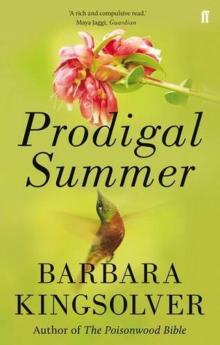 Prodigal Summer: A Novel
Prodigal Summer: A Novel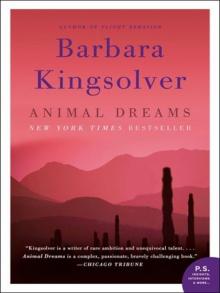 Animal Dreams: A Novel
Animal Dreams: A Novel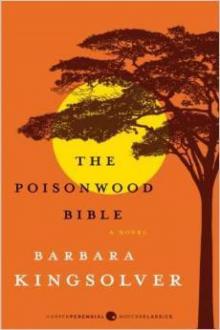 The Poisonwood Bible
The Poisonwood Bible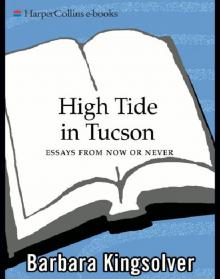 High Tide in Tucson
High Tide in Tucson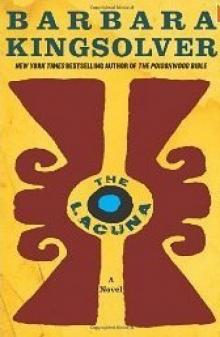 The Lacuna
The Lacuna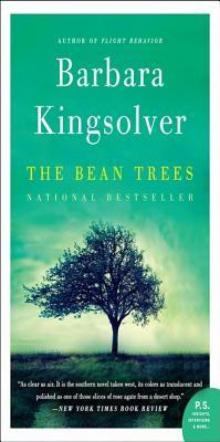 The Bean Trees
The Bean Trees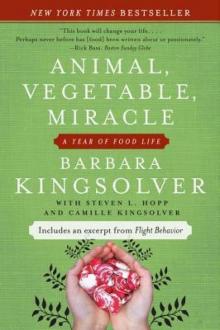 Animal, Vegetable, Miracle: A Year of Food Life
Animal, Vegetable, Miracle: A Year of Food Life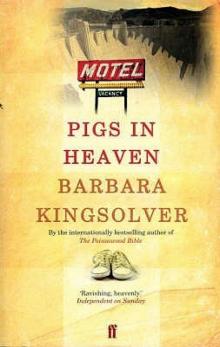 Pigs in Heaven
Pigs in Heaven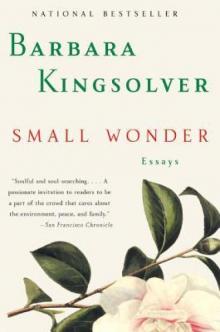 Small Wonder
Small Wonder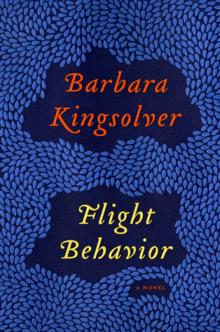 Flight Behavior
Flight Behavior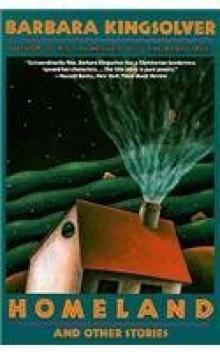 Homeland and Other Stories
Homeland and Other Stories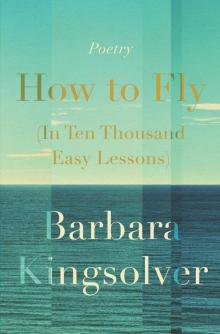 How to Fly (In Ten Thousand Easy Lessons)
How to Fly (In Ten Thousand Easy Lessons) Unsheltered
Unsheltered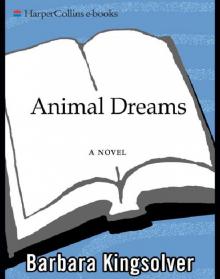 Animal Dreams
Animal Dreams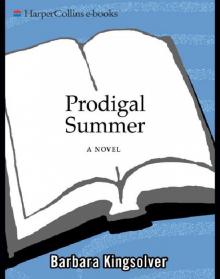 Prodigal Summer
Prodigal Summer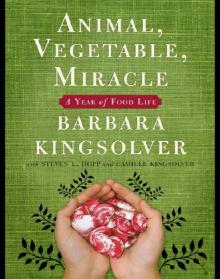 Animal, Vegetable, Miracle
Animal, Vegetable, Miracle